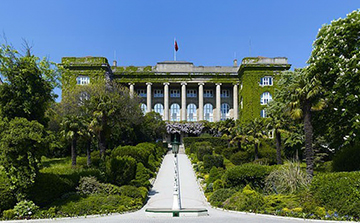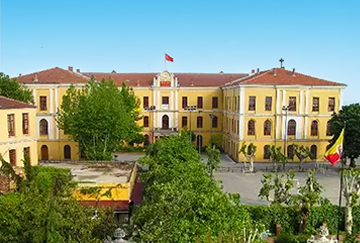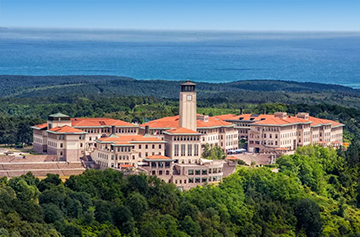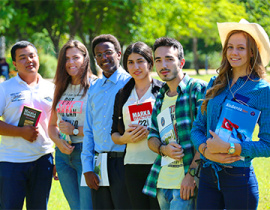Complete Turkey Education Guide for Foreign Students
Are you dreaming of a life in Turkey with your family? That's an appealing idea: A good education system, beautiful nature, and a profitable real estate market await you here.
These are enough to start a new page in a brand-new country. But, you may want to think of some factors. The most important ones are choosing a good home, neighborhood, and school for your child.
 First things first: the education system in Turkey is very simple. Here are the basics:
First things first: the education system in Turkey is very simple. Here are the basics:
- Education is compulsory and free until the end of 12th grade.
- You may choose public, private, and international schools.
- Undergraduate levels are all centralized by MEB (The Ministry of National Education).
- Higher education in Turkey is centralized by YÖK (Council of Higher Education).
These are the basics. Now we may cover all about the education structure in Turkey. Let’s dive in from the early ages of education, and cover all levels. This way, you can plan your child's or your own education thoroughly!
Preschool Stage | Age 3-6
Preschool education is not compulsory, but advised. There are various public and private kindergartens and preschools. They build a foundation in different subjects and help improve basic motor skills.
Foreign parents may consider early childhood education. The institutions aim to help the child adjust to the country and give language skills too.
Primary and Elementary Education | Age 6-14
 Primary schools are all centralized by MEB. They teach literacy, language learning, mathematics, and basic social studies. International students can have Turkish language courses.
Primary schools are all centralized by MEB. They teach literacy, language learning, mathematics, and basic social studies. International students can have Turkish language courses.
Elementary schools cover second language, math, social and physical science, literature, fine arts, and PE.
Students can take the LGS exam at the end end of the 8th grade. It allows them to apply to certain schools. When they don’t, the system automatically places them in a close school to their home. They can choose and change the type of this school.
Private high schools may accept LGS results or carry out their exams. They also offer scholarships based on the student's success rate.
Public Schools in Turkey
Public schools are free for everyone to allow equal opportunities. They follow MEB-based curriculums and get students ready for high school and university. They may give extra after-class courses for students as well.
Private Schools in Turkey
Private schools have more services for their students. These include school services and social activities. Teachers inform parents about their child's situation. Private schools may be more helpful during exam preparation.
International Schools in Turkey
 International schools are some of the best schools in Turkey. They are similar to private schools, but there are some differences:
International schools are some of the best schools in Turkey. They are similar to private schools, but there are some differences:
They aim to give the education a student would get in his or her home country. They need to follow certain rules but may have wider curriculums. This depends on their origin countries and education goals.
These schools may have German, British, USA, French, and Russian originations. In that case, they can extend topics to match with origin countries.
Parents often choose İstanbul, Ankara, and Antalya for their children’s education. If you want alternatives, you can also discover the international schools in İzmir. They give comprehensive education to children of all ages.
Secondary Education | Age 14-18
Secondary education, or high school education, comes in many shapes in Turkey. There are different high schools. These are the public high school types in Turkey:
Science High School: They give education to the most successful students. Candidates must get a high score on the LGS.
 Anatolian High School: These are the most common high schools in Turkey. Almost all of them require a good LGS exam result. After 10th grade, students learn separate subjects for their academic goals.
Anatolian High School: These are the most common high schools in Turkey. Almost all of them require a good LGS exam result. After 10th grade, students learn separate subjects for their academic goals.
Vocational High Schools: They provide education in business sectors like industry, health, commerce, and aviation. Candidates don't need LGS results.
Fine Arts and Sports High Schools: Students with special talents in painting, music, and sports go to these schools. Schools conduct talent exams for applicants.
Imam Hatip High Schools: These are the religious-orientated schools in Turkey. Candidates don’t need LGS exam results.
You may prefer private and international schools as well. They put special emphasis on students’ academic goals and levels. They have exams to determine the student’s needs during the university preparation.
Private schools put special emphasis on students’ academic goals and levels. They carry out evaluation exams to determine the student’s needs during the university preparation.
High school graduates and near-graduates can take the YKS exam for university entrance. It has 2 sections: one for common subjects, and one for their fields.
Higher Education in Turkey
Higher education costs in Turkey are next to zero. Public universities are free for Turkish citizens, and very cheap for foreign students.
After the YKS exam, candidates make a list of preferred universities and departments. After, the system places them. It's possible to change universities later. Private universities may require YKS results or make their own.
International students need a high school diploma and take the YÖS exam. There are plenty of departments with 100% English lectures. So foreigners can have a university degree in Turkey without speaking any Turkish.
The universities follow international standards. Students may choose associate's or bachelor’s degrees and can continue education with postgraduate degrees.
Foreign students can choose almost all cities in Turkey. But, Ankara for expat students is perfect. You can also choose İstanbul, İzmir, and Antalya.
 Here are the best universities in Turkey:
Here are the best universities in Turkey:
- Hacettepe University
- METU
- İstanbul Technical University
- Boğaziçi University
- Sabancı University
- Ege University
- University of Economics
- Akdeniz University
- Bilim University
Frequently Asked Questions
Here is what you want to know about Turkey's education system:
What are the requirements for international students to enroll in a school in Turkey?
- They need equivalence documents from the Ministry of the Interior for application to all schools. Diplomas and student forms are valid.
- If the students don’t have documents, they need to take an evaluation exam.
- They must have a passport, student visa, and at least 1-year of residence permit.
How can I enroll my child in a school in Turkey?
For public schools, you need the documents mentioned just above. After, you can either enroll your child in the school or on the official E-Okul webpage.
Private schools want documents as well. Some of them have their exams for acceptance. You can find it all on their websites.
What are the differences between public and private schools in Turkey?
 First of all, public schools are free, and private schools are not. Public schools have cafeterias, gyms, and other facilities for students. Private schools provide more amenities and closer care for each student.
First of all, public schools are free, and private schools are not. Public schools have cafeterias, gyms, and other facilities for students. Private schools provide more amenities and closer care for each student.
As a result, most foreign parents choose private or international schools for their children. Also, private and international schools start teaching second language at earlier ages.
Is it necessary to learn Turkish in school?
It depends on the school. If your child goes to public or private school, he or she needs to learn Turkish. The schools often have extra courses for this. But this is different in international schools.
Most international schools aim to help their students be fluent in Turkish. But most of them give lectures in English, German, French, or Russian. So, it all depends on the school.
What are the requirements for getting into a Turkish university?
First, you need a high school diploma from an accredited institution. Later, you need to take the YÖS exam. Universities may carry out their exams at this stage too.
When your result comes, you can apply to the university you like. Keep in mind that universities have fewer quotas for international students.
Is religious education mandatory in Turkish schools?
 No. Between the 4th and 12th grades, religious education is in the curriculums of all schools. But any student can get an exemption from these courses. When they get it, they don’t have to answer questions on religion in exams like LGS and YKS.
No. Between the 4th and 12th grades, religious education is in the curriculums of all schools. But any student can get an exemption from these courses. When they get it, they don’t have to answer questions on religion in exams like LGS and YKS.
Most international schools don't teach religious courses. But there are religion-based international schools as well.
Is the Turkish education system good?
Yes. Education is free and compulsory for all students. It aims to provide equal opportunities, comprehensive learning, and academic motivation. So, if you’re planning on moving to Turkey with your family, you can have peace of mind about your child’s education.
Also, Turkey is a well-developed country in many ways. So it offers more than a quality education. You can easily find job opportunities, have a peaceful seafront living, or enjoy a big city life.
The advantages of living in Turkey don't end with education! Buying a Turkish property comes with plenty of benefits. You can find your dream home and enjoy the high ROI rates at the same time. Connect with the TEKCE team now to make this dream a reality!










